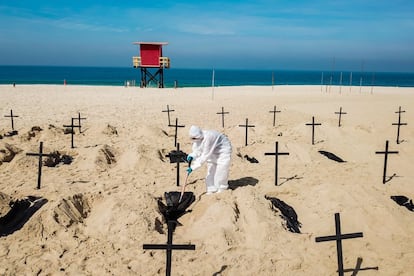Fearless aesthetics
Painting murals on streets and digging graves in beaches are acts of courage against the powers that control public spaces

It’s a word that sounds more like legal or theological jargon: parrhesia. Michel Foucault took it from the Greek parrhēsía, which literally means “to speak everything,” to describe the “true word,” the boldness displayed by those who speak up to challenge the powers that be. It is the courage of truth. Anyone who assumes the duty of telling the truth in an authoritarian regime faces risks, because speaking up means taking a risk. The act of telling the truth can also be an aesthetic act, like the Black Lives Matter mural on the streets of Martinez in California, or the crosses on Copacabana Beach in Rio de Janeiro in tribute to those killed during the Covid-19 pandemic.
Authoritarians cannot stand the truth. And they repeat themselves when faced by the parrhesia of the fearless
“Black Lives Matter” was written in huge letters on a road in California. The bright yellow of each letter stood out against the black asphalt, the same kind of pavement where George Floyd died gasping for breath after a police officer in Minneapolis held him on the ground with his knee for nearly 10 minutes. The boldness of those who planted this truth against racism was relative, since the city had authorized the art installation. The truth hit home. Armed with a bucket of black paint, a white man and woman set about destroying the words of truth. Since the patriarchy is deeply entrenched in racists, the man served as the spokesperson for “Make America Great Again,” while the woman scrubbed the ground. The man fumed: “The narrative of racism, it’s a lie.”
Authoritarians cannot stand the truth. And they repeat themselves when faced by the parrhesia of the fearless. Brazil is the epicenter of the global Covid-19 pandemic. It has tallied more than 65,000 deaths and its president – who has contracted the virus – disputes the use of masks like someone protecting his masculinity. Forty volunteers from the NGO Rio de Paz (Peaceful Rio) gathered for a protest on Copacabana Beach. They dug 100 graves in the sand, symbolizing Covid-19 victims, and planted crosses, some draped in Brazilian flags. One banner read: “Brazil is moving in the opposite direction from the rest of the world.”
The truth-telling graves enraged an ally of President Jair Bolsonaro, who turned his body into an instrument of destruction. But while this man knocked over crosses and destroyed graves, a grieving father put them back in place. “I was just walking down the beach and saw this demonstration in support of the victims. My act was a voluntary one by a father who is suffering great pain,” said the man who was not part of the act, but the fearless body on the scene. His mourning for his dead son made him an activist at a public act in which he had not planned to take part. He was an activist for the right to grieve publicly.
What do these two scenes have in common? They challenge spaces of public appearance; they are courageous acts of truth. Painted streets or grave-dug beaches are acts of fearlessness against the powers that control public spaces, from people coming together through the experience of grief. Judith Butler explores how parrhesia, “fearless speech,” is a form of resistance and risk-taking; it is the body telling the truth in a game where life itself is risked, because the will for truth is stronger than fear. Those who paint the streets yellow where George Floyd was killed or erect crosses on Copacabana Beach in the middle of a pandemic declare with their bodies: “This is grief conquering fear.”
Debora Diniz is a Brazilian anthropologist and researcher at Brown University.
Giselle Carino is an Argentinian political scientist and IPPF/WHR director.
Tu suscripción se está usando en otro dispositivo
¿Quieres añadir otro usuario a tu suscripción?
Si continúas leyendo en este dispositivo, no se podrá leer en el otro.
FlechaTu suscripción se está usando en otro dispositivo y solo puedes acceder a EL PAÍS desde un dispositivo a la vez.
Si quieres compartir tu cuenta, cambia tu suscripción a la modalidad Premium, así podrás añadir otro usuario. Cada uno accederá con su propia cuenta de email, lo que os permitirá personalizar vuestra experiencia en EL PAÍS.
¿Tienes una suscripción de empresa? Accede aquí para contratar más cuentas.
En el caso de no saber quién está usando tu cuenta, te recomendamos cambiar tu contraseña aquí.
Si decides continuar compartiendo tu cuenta, este mensaje se mostrará en tu dispositivo y en el de la otra persona que está usando tu cuenta de forma indefinida, afectando a tu experiencia de lectura. Puedes consultar aquí los términos y condiciones de la suscripción digital.








































